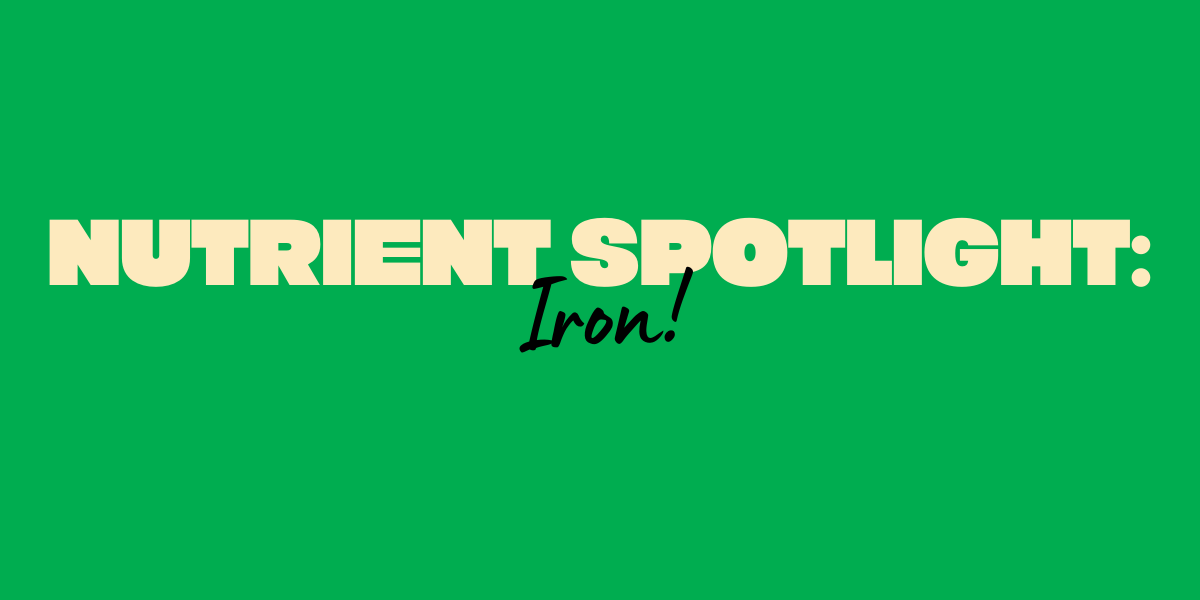KOJA Blog
KOJA Health was started as a real food alternative to synthetic supplements and pills. We believe in eating real food in order to feel better and it's our mission to make Australians Healthier! There's so many vitamins and minerals available in real food sources which is where we believe we should be getting our nutrients from. One of the most over (self) prescribed vitamins in synthetic form is Iron. That's why we created KOJA Fig & Hazelnut, our wholefoods alternative to an iron tablet.
Are you getting enough Iron in your diet?
For a lot of Australian women, Iron deficiency is the most common mineral deficiency and can have debilitating effects on our energy levels. Hands up if you’re always tired, lacking energy and generally fatigued? Due to our fast paced lives, this probably describes many of us, however it may be more than those late nights.
If you’ve been diagnosed with an Iron deficiency, a GP Doctor will probably recommended synthetic Iron supplements as the solution. We’re not here to disagree with your Doctor, but we do want to make sure that you’ve got all the information you need to make the best decisions for your health. Synthetic Iron supplements can be detrimental to other aspects of your health, with possible side effects such as constipation, diarrhea, stomach pain, nausea, intestinal inflammation, and risk of overdose.
To maintain your health and feel like the best version of yourself, you need to make sure you’re eating Iron rich foods in your diet. Eating plenty of Iron rich wholefoods is the best way to prevent Iron deficiency, and to increase your energy levels.
If you have been diagnosed with an Iron deficiency, we recommend you visit a naturopath or a GP to talk about wholefood sources of Iron before changing your diet or medication.
Why do we need iron?
Iron’s main role is to transport oxygen in the body and is mostly found in the body as a component of haemoglobin (in red blood cells) and myoglobin (in muscle tissue).
We can lose iron through blood loss, sweat and intestinal cells and iron deficiency is very common due to inadequate intake, absorption issues, exercise, increased need (pregnancy) or through blood loss (including menstruation), so particularly as women we need to absorb iron daily to maintain a good iron store balance.
What is iron deficiency?
Men need to absorb about 1 milligram (mg) of iron per day and menstruating women about 1.5 mg per day, but the intake of iron needs to be much more as we only absorb a small portion of what we eat. The recommended dietary intake (RDI) per day ranges from 8 milligrams per day for children, men, women during lactation and for women over 51, to 18 mg per day for women between 19-50 and 27 mg per day during pregnancy.
High risk groups include menstruating teenagers and women, pregnant and lactating women.
What are good sources of iron?
The best sources of iron are from the food we eat. Meat and poultry contain haem iron which is well absorbed in the body (about 25% of the intake is absorbed), but most of the iron we eat is in the form of non-haem iron found in plant foods (of which about 17% is absorbed). These are the plant based ingredients found in KOJA Fig & Hazelnut Breakfast Topper.
Good vegetable sources of iron include:
- nuts
- seeds
- green leafy cooked vegetables (including broccoli, kale)
- legumes
- dried fruit
KOJA Fig & Hazelnut contains nuts, seeds, dried figs, cacao and mesquite powder and one serve would contribute 3 mg of iron to your day, which is about 40% of the daily requirement for children, men, lactating women and women over 51. For women between 19-50, it would account for about 20% and about 10% for pregnant women.
How can you increase iron absorption?
Eating vitamin C rich foods alongside iron containing plant foods will increase the absorption of iron as it captures the iron and makes it ready for absorption.
Vitamin C rich foods include:
- strawberries
- watermelon
- kiwi fruit
- oranges
- mango
- red capsicum
- dark leafy green vegetables
- parsley
- potatoes
You can top your breakfast with 2 tablespoons of KOJA Fig & Hazelnut along with strawberries and kiwi fruit to increase absorption, or mix KOJA Fig & Hazelnut in a bowl with oranges and watermelon.
What else makes KOJA FIG & HAZELNUT so good?
Source of Minerals - Iron, Magnesium, Potassium, Calcium, Zinc and more. Our bodies need minerals to perform many functions such as immune health, nerve & muscle function, and energy production.
Plant based Iron – If you’re low in Iron, try having KOJA without dairy to assist with better Iron absorption. Also pairing it with fruit high in Vitamin C is ideal- try strawberries or oranges.
Healthy Fats – KOJA is a good source of healthy fats, found naturally in nuts and seeds. These good fats keep us full, and are needed to absorb other nutrients. They’re also essential for hormone production. Healthy fats are not to be feared!
Health, Nutrition Next Post Previous Post

